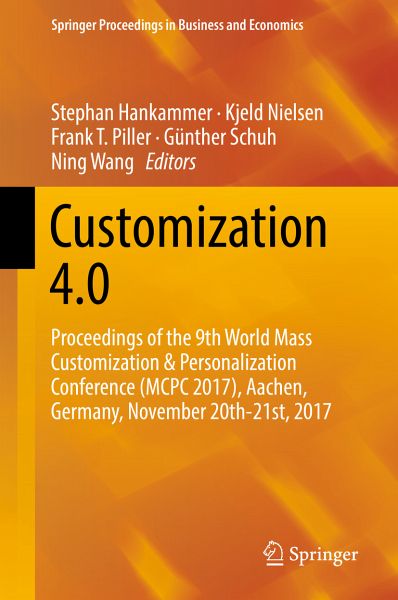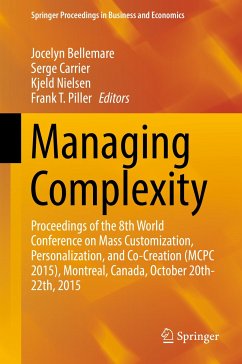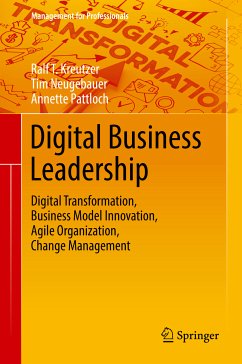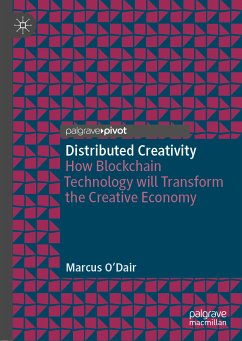
Customization 4.0 (eBook, PDF)
Proceedings of the 9th World Mass Customization & Personalization Conference (MCPC 2017), Aachen, Germany, November 20th-21st, 2017
Redaktion: Hankammer, Stephan; Wang, Ning; Schuh, Günther; Piller, Frank T.; Nielsen, Kjeld
Versandkostenfrei!
Sofort per Download lieferbar
136,95 €
inkl. MwSt.
Weitere Ausgaben:

PAYBACK Punkte
68 °P sammeln!
This proceedings volume presents the latest research from the worldwide mass customization & personalization (MCP) community bringing together new thoughts and results from various disciplines within the field. The chapters are based on papers from the MCPC 2017. The book showcases research and practice from authors that see MCP as an opportunity to extend or even revolutionize current business models. The current trends of Industrie 4.0, digital manufacturing, and the rise of smart products allow for a fresh perspective on MCP: Customization 4.0. The book places a new set of values in the cen...
This proceedings volume presents the latest research from the worldwide mass customization & personalization (MCP) community bringing together new thoughts and results from various disciplines within the field. The chapters are based on papers from the MCPC 2017. The book showcases research and practice from authors that see MCP as an opportunity to extend or even revolutionize current business models. The current trends of Industrie 4.0, digital manufacturing, and the rise of smart products allow for a fresh perspective on MCP: Customization 4.0. The book places a new set of values in the centre of the debate: a world with finite resources, global population growth, and exacerbating climate change needs smart thinking to engage the most effective capabilities and resources. It discusses how Customization 4.0 fosters sustainable development and creates shared value for companies, customers, consumers, and the society as a whole. The chapters of this book are contributed by a wide range of specialists, offering cutting-edge research, as well as insightful advances in industrial practice in key areas.
The MCPC 2017 has a strong focus on real life MCP applications, and this proceedings volume reflects this. MCP strategies aim to profit from the fact that people are different. Their objective is to turn customer heterogeneities into opportunities, hence addressing "long tail" business models. The objective of MCP is to provide goods and services that best serve individual customers' needs with near mass production efficiency. This proceedings volume highlights the interdisciplinary work of thought leaders, technology developers, and researchers with corporate entrepreneurs putting these strategies into practice.
Chapter 24 is open access under a CC BY 4.0 license via link.springer.com.
The MCPC 2017 has a strong focus on real life MCP applications, and this proceedings volume reflects this. MCP strategies aim to profit from the fact that people are different. Their objective is to turn customer heterogeneities into opportunities, hence addressing "long tail" business models. The objective of MCP is to provide goods and services that best serve individual customers' needs with near mass production efficiency. This proceedings volume highlights the interdisciplinary work of thought leaders, technology developers, and researchers with corporate entrepreneurs putting these strategies into practice.
Chapter 24 is open access under a CC BY 4.0 license via link.springer.com.
Dieser Download kann aus rechtlichen Gründen nur mit Rechnungsadresse in A, B, BG, CY, CZ, D, DK, EW, E, FIN, F, GR, HR, H, IRL, I, LT, L, LR, M, NL, PL, P, R, S, SLO, SK ausgeliefert werden.












